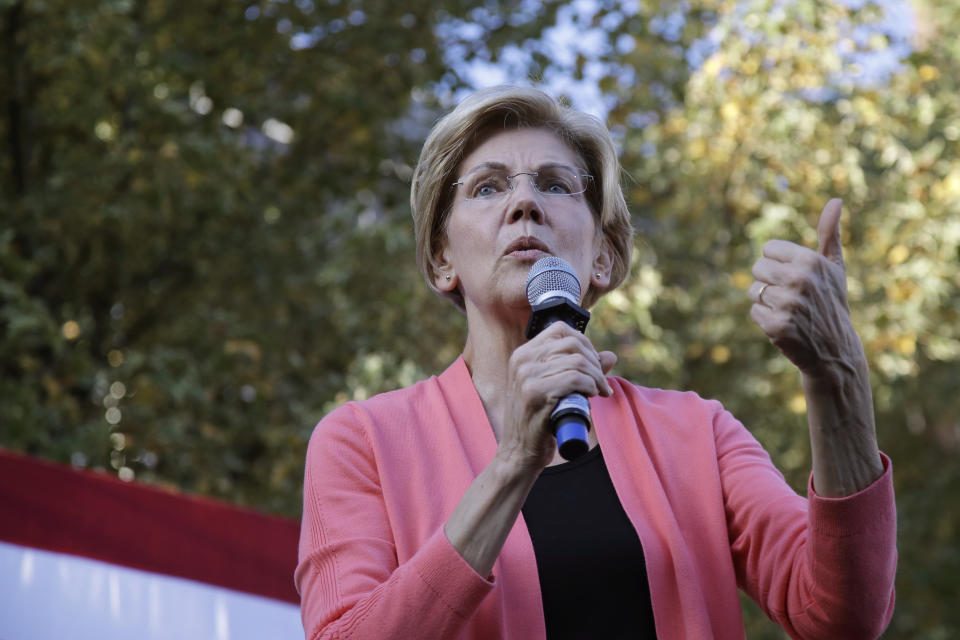Elizabeth Warren Wants To Tax Corporate Lobbying
Sen. Elizabeth Warren (D-Mass.) has a plan to crack down on lobbying in Washington: She wants to institute a progressive tax on “excessive” lobbying expenditures.
The proposal from the 2020 Democratic presidential candidate was first listed among her proposals to rein in Washington lobbying in September, but she is now providing extensive details.
She would place a 35% tax on annual lobbying expenses above $500,000 for corporations and trade organizations. The tax rate will increase to 60% for expenses over $1 million and then 75% for spending exceeding $5 million.
The income generated by the new tax will be placed in a “Lobbying Defense Trust” that will be used to help fund congressional support agencies, such as a reinstated Office of Technology Assessment and the Congressional Budget Office, and heavily lobbied executive branch agencies. It would also create an Office of the Public Advocate to help regular people better influence government decision-making.
The general idea is that a tax on lobbying creates a market-based mechanism to discourage corporate spending that seeks to gain from making back-room deals rather than creating wealth. Currently, there is a strong incentive for corporations and other special interests to spend heavily on lobbying to obtain beneficial treatment. All combined, more than $3 billion was spent on reported lobbying expenditures in each of the past 10 years. Corporations make up the largest share of this spending.
Total revenue from the proposed lobbying tax would have raised $10 billion over the past 10 years, according to an analysis provided by the Warren campaign.
Fifty-one corporations would have been hit with the highest proposed tax rate of 75% for spending above $5 million. These companies and trade groups include the U.S. Chamber of Commerce, Koch Industries, Exxon, Boeing, Microsoft, Pfizer, Walmart, Google and Facebook.

The lobbying tax is one of many proposals Warren has introduced to crack down on corruption in Washington. She has proposed banning elected lawmakers and top officials from lobbying, expand the definition of lobbying to increase disclosure, ban foreign lobbying and ban lobbyists from donating or raising campaign money, among other things.
The thinking behind Warren’s tax on lobbying expenditures is slightly different ― maybe even opposed to ― the restrictions on lobbying usually considered by Congress. It can be argued that some of these restrictions have simply had the effect of making lobbying less transparent ― as more people involved in the influence industry find loopholes to evade registering as lobbyists. The tax, however, is simply a mechanism to deter excessive lobbying ― or at least impose a cost on it.
This is what Luigi Zingales, a professor at the University of Chicago Booth School of Business, thought when he proposed a tax on lobbying in his 2012 book, ”A Capitalism for the People.” The Warren campaign consulted him when crafting the proposal.
“If you tax lobbying in a progressive way then it reduces the influence of the largest companies on the important decisions,” Zingales told The Economist in a 2012 interview. “People lobby because there’s a high return, but if you start taxing them and using some of that money to subsidise the opponents then it evens out.”
And that is Warren’s thinking, too.
“My new lobbying tax will make hiring armies of lobbyists significantly more expensive for the largest corporate influencers like Blue Cross Blue Shield, Boeing, and Comcast,” Warren said in a post explaining the new tax policy. “Sure, this may mean that some corporations and industry groups will choose to reduce their lobbying expenditures, raising less tax revenue down the road ― but in that case, all the better.”
Related Coverage
Kamala Harris Has The Perfect Response To Maya Rudolph's 'SNL' Spoof
Bernie Sanders Raised More Than $25 Million This Quarter, Campaign Says
Pete Buttigieg's Campaign Says He Raised More Than $19 Million In Third Quarter
Bernie Sanders Spends $1.3 Million On His 1st TV Ads For 2020
Love HuffPost? Become a founding member of HuffPost Plus today.
This article originally appeared on HuffPost.

